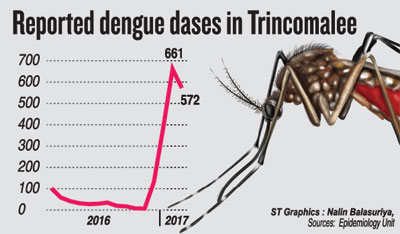News
Deadly dengue epidemic brings Kinniya to its knees
 Badly-equipped hospitals are overwhelmed by hundreds of suspected cases of dengue haemorrhagic fever in the wake of an epidemic in Kinniya in the Eastern Province. Outpatient departments are stretched, hospital authorities complain.
Badly-equipped hospitals are overwhelmed by hundreds of suspected cases of dengue haemorrhagic fever in the wake of an epidemic in Kinniya in the Eastern Province. Outpatient departments are stretched, hospital authorities complain.
Following appeals from the Muslim community and 13 deaths in two weeks, a dozen doctors have been sent to Kinniya. The Epidemiology Unit of the Ministry of Health on Friday assigned the doctors.
The Trincomalee district last week reported 13 deaths in two weeks including two school children and seven females including a pregnant woman. Nine deaths were from Kinniya, three from Kurunchkerni and one from Kuchchiveli. Also around 2,300 patients sought treatment in the Trincomalee district with 350 suspected cases treated at the Trincomalee Base hospital. Further 900 patients were treated in Muttur and 266 in Uppuveli.
For three days until the past Friday, 66 schools in the Kinniya education division were closed. A group made up of the army, police and the public health inspectors doing the rounds, cleaning up and fumigating buildings and households.
Kinniya Base Hospital, Medical Superintendent, Dr. A. H. Sameem said more than 120 suspected were being treated. But, he said, the hospital was not equipped to cope with the surge of patients. The hospital has only 60 beds, but on Friday they had to accommodate 123 patients.
“Our out patient department facilities are limited and we are getting help from hospitals in Batticaloa and Anuradhapura,’’ he said.
Eastern Provincial Director, Dr. A. Lathaharan, pointed to open and tube wells as vector breeding grounds. Non-government organizations in the Eastern Province have built tube wells for 60 families.
Moreover, he said, the Muslim community, due to cultural barriers, sometimes does not allow health inspectors, to check their premises. “Our officers had to enter premises by force with the aid of the police,” he said.
“We are conducting awareness programmes and taking legal action. The Medical Officer of Health has filed 190 cases in Trincomalee, 200 cases in Kuchchiveli and 70 cases in Kinniya,’’ he added.
Eastern Province Health Ministry Secretary, K. Karunaharan, said the ministry was taking preventive and curative action and reviewing the results weekly. “This is unexpected and we are co-ordinating with the line ministry to bring the situation under control. We had a similar situation in 2014, but the number of cases was only around 700. But this time the figure is over 2,000 in three weeks and that is high,’’ he said.
He confessed that there were not enough health inspectors to check homes. “We have a PHI cadre of 206 personnel but have 43 vacancies,’’ he said.
Meanwhile, the Sri Lanka Muslim Council has written to the Minister of Health Dr. Rajitha Senaratne, requesting that the situation in Kinniya be treated as a ‘medical emergency’ and to mobilise doctors from Colombo.
| Helpless families face the unknown Families of victims of the DHF said that they cannot understand how their family members died despite seeking treatment immediately at the onset of fever. Mohamed ali Rizwan, 47, from Kinniya whose wife Rizwan, 38, died last week said he had sought treatment at the Kinniya base hospital immediately. He said Rizwan was admitted to the Kinniya Hospital for two days and then transferred to the Trincomalee district hospital where she died after two days. “We were told that DHF is a treatable disease and cannot understand how she died within days,’’ he said. Meanwhile, a mother who lost two of her children, a daughter, Nazeeva (31) and son, Faizer, 42, said they died within two days. “We have doubts whether this is DHF or some other killer disease,’’ she said. |

